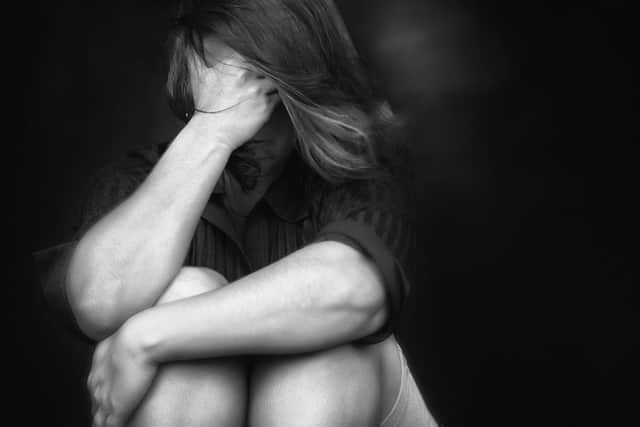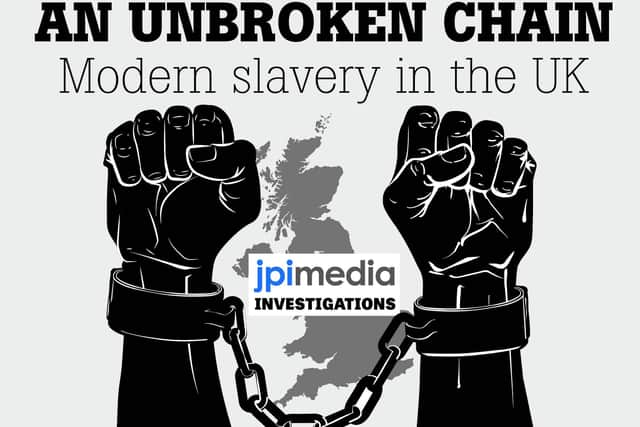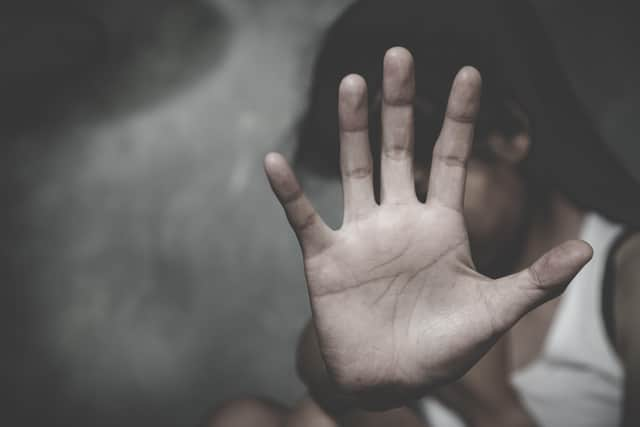Only three suspects charged with modern slavery offences in Sussex since 2015
and live on Freeview channel 276
The landmark legislation was designed to crack down on the ‘appalling crime’ – which ranges from forced prostitution to labour exploitation and domestic servitude – with simplified offences and tougher punishments.
But a JPIMedia investigation has exposed the extent to which perpetrators are escaping justice.
Advertisement
Hide AdAdvertisement
Hide AdJust 4.4 per cent of modern slavery offences recorded by English and Welsh police forces between 2015 and September 2020 resulted in a charge.


Independent Anti-Slavery Commissioner Dame Sara Thornton – a role created by the 2015 Act – said the current lack of risk to criminals ‘fails to counter the economic reward of trafficking in people, or prevent organised crime groups acting with impunity’.
Sussex Police has charged just three people since 2015, despite recording 601 modern slavery offences.
This results in a charge rate of 0.5 per cent – the third lowest of any police force in England and Wales.
A challenging crime


Advertisement
Hide AdAdvertisement
Hide AdDetective Chief Inspector Kris Ottery said modern slavery was ‘a complex and challenging world of investigation’ but ‘certainly something that is right up there on our priorities’.
“We really do aspire to get that charge rate up,” he said. “We want to hold people to account if they are exploiting people.”
A breakdown of crime outcome figures show that, in almost half of the 255 modern slavery offences recorded by the force in 2019/20, no suspect could be identified.
Mr Ottery said: “If you take the example of a county line drug dealer, it may be that we encounter the young person but actually we’ve got no trace back to the person who’s exploiting them.


Advertisement
Hide AdAdvertisement
Hide Ad“So we may feel that they’re being exploited, they may tell us they’re being exploited, but unless we find something to link them to that third party, that can be challenging to identify a suspect.”
Giving another example, he said: “It may be we go to a report of a pop-up brothel.
“When you go to the address you may encounter a sex-worker in the premises, but again, potentially nothing there that leads to any trace of the other person involved.”
Victims living in fear
Another common reason why investigations fail is that victims do not support further action.
Advertisement
Hide AdAdvertisement
Hide AdThis was the case for a third of the crimes recorded in 2019/20.
Mr Ottery said there were many reasons why victims might be reluctant to support investigations.
“Some of them are really concerned and in fear to what may happen if they do,” he said.
“They might be under some debt bond or some threat if they’re not to comply with the people who control them.”
Advertisement
Hide AdAdvertisement
Hide AdIn view of this, many officers have undertaken specialist victim support training, and Mr Ottery said charity workers and translators often accompanied police on raids to help engage with victims: “So that from the outset we’re able to make that person feel more comfortable, less frightened.”
Modern slavery cases often involve organised crime groups who were ‘quite sophisticated’, he said.
“We may get victims who are scripted to tell whoever may be enquiring into their circumstances a certain story to detract attention from them,” he said.
“[The perpetrators] don’t want to be caught, so they don’t necessarily leave evidence on a plate for us.
Advertisement
Hide AdAdvertisement
Hide Ad“If we get a victim who is not willing to engage, and then in the particular location that we are operating there is no evidence, then we are really struggling.”
But he said police would always try and achieve evidence-based prosecutions ‘even where there might not be that victim support’, because ‘we need to put a stop to this behaviour’.
Making Sussex hostile for perpetrators
At the same time, criminal charges were ‘not the whole picture’, he said.
Police work closely with organisations with different powers that can be used to disrupt perpetrators.
Advertisement
Hide AdAdvertisement
Hide Ad“There’s so many other partners that can help us make Sussex hostile to the exploiters, so it’s really hard to actually pay someone below the minimum wage, or you can’t put lots of people in a house of multiple occupation in poor living conditions,” he said.
In a recent example of this, the Health And Safety Executive (HSE) took action after two Romanian men were found living in ‘filthy’ conditions in the former TJ Hughes site in Eastbourne last month – with no hot water, and no shower facilities or protective equipment.
HSE issued an immediate Prohibition Notice on the building to prevent workers from sleeping there again, due to lack of fire precautions, and issued a Notification of Contravention (NoC) because the site had no hot running water, no means of heating food or flushing toilets.
Police have also launched an investigation into possible modern slavery charges in relation to the incident.
Advertisement
Hide AdAdvertisement
Hide AdKaty Bourne, the police and crime commissioner for Sussex, said there were currently 25 live police operations in Sussex that were either exclusively or partly relating to modern slavery.
One of the cases in Brighton and Hove has been running for two years, ‘which shows you how difficult they are’, she said.
Raising awareness
She said great progress had been made in raising awareness of modern slavery – with members of the public now much more able to spot the signs.
She said: “They refer to modern slavery as hidden in plain sight.
Advertisement
Hide AdAdvertisement
Hide Ad“Getting the public to recognise it is absolutely important. Members of the public are the eyes and ears of the police.”
She said many investigations were sparked by a residents calling and saying: “I’m not sure but...”
Mr Ottery agreed. “What is really reassuring is that people are more keen to report it now and they recognise it in a wide range of settings,” he said.
“We want people to keep reporting it and we will always do our utmost to investigate it.”
Charge rate falling year on year
Advertisement
Hide AdAdvertisement
Hide AdAcross England and Wales, Home Office figures show police forces have recorded 19,632 offences under the Modern Slavery Act to date.
But just 864 of these saw a suspect charged.
The proportion of cases resulting in a charge has fallen every year since 2015 as the volume of offences has increased.
In 2015/16, 23.7 per cent of cases saw charges brought. In 2016/17, the charge rate was 8.3 per cent, in 2017/18, 6.7 per cent, 2018/19, 4 per cent, and in 2019/20, 2.9 per cent.
The Human Trafficking Foundation, which brings together charities, public bodies and parliamentarians working to tackle slavery, has called for a ‘radical’ change in how UK authorities pursue offenders and support victims.
Advertisement
Hide AdAdvertisement
Hide AdThis includes amending the 2015 Act to lower the threshold of what constitutes modern slavery and better recognise non-violent means of coercion, she said.
Safeguarding Minister Victoria Atkins said the Home Office has allocated £2 million to support police with modern slavery work this year and had invested £11.3 million over the past three years into the Modern Slavery Transformation Programme to boost prosecutions.
Find out more about modern slavery by visiting Sussex Police’s website here.